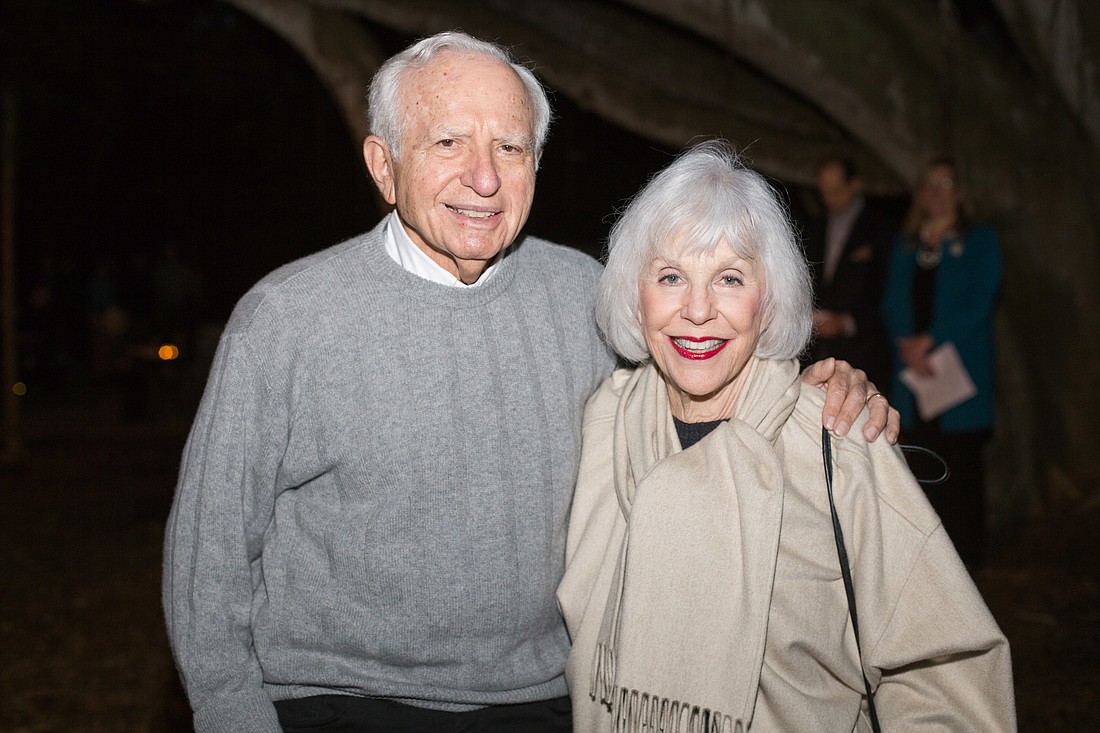- January 22, 2025
-
-
Loading

Loading

It was easy to see Charles and Margery Barancik loved what they were doing.
You could see it in their smiles, jokes and gratitude. And in the work done by the Charles and Margery Barancik Foundation, which they founded in 2014 with $100 million.
“They were really incredibly fun and present,” said Michael Donald Edwards, the artistic director for Asolo Repertory Theatre. “They wore their position very lightly. They were very easy and natural to be around.”
Charles, 91, died in a traffic crash on Longboat Key on Dec. 18. Margery, 83, died at Sarasota Memorial Hospital a day later as a result of her injuries. They had been married since 1960 and raised three children. They had three grandchildren, as well.
Their family foundation became known regionally for its generosity, courage and ability to direct resources toward complex social problems. Among the success stories was an effort called First 1,000 Days, an initiative to inform and connect new mothers with existing resources in the community for the ultimate well-being of their new or growing families.
“They felt an extreme urgency to get to the root of the issue,” said Kelly Romanoff, the Barancik Foundation’s impact and innovation officer. “Why go lightly when you have lives on the line, and you know that your philanthropy can make a difference?”
According to the organization’s website, more than $53 million has been awarded to 154 nonprofits in its five-year history. Among the diverse recipients: Gulf Coast Community Foundation, Massachusetts General Hospital, Take Stock in Children of Sarasota County, Education Foundation of Sarasota County, Ringling College of Art and Design, Sarasota County School District, Sarasota Bay Watch, Sarasota Ballet, Girls Inc., Boys & Girls Clubs of Sarasota County.
“I don’t think every philanthropist has that courage, quite honestly, or that risk tolerance to tackle those big issues,” Romanoff said. “[The Baranciks] recognize that you can give a lot of money away and still not solve the problem, that you have to get to the root issue and work at the systems level to try to improve the service delivery.”
Charles began his professional career as a certified public accountant after earning a business administration degree from Northwestern University. Beginning in 1956 and for the next 30 years, he purchased and ran 10 manufacturing companies. Among them is Justrite Manufacturing Co., which built carbide lamps and fire-protection gear, which sold to Federal Signal in 1994. Mayline, which made office furniture, was acquired in 1975 and sold in 2007, and Hamilton Industries, which produced office and laboratory furniture and was sold after 10 years in 1992.
Romanoff said the atmosphere around the table during board meetings, with several family members participating, sometimes resembled a dining room instead of a business gathering, with Charles and Margery often holding hands.
“They would make marital jests,” Romanoff said. “[Margery] would say, ‘Oh Chuck, if I disagree with you, you might leave me.’ And of course, they’d been married going on 60 years.”
She said she recently visited to help them set up a smartphone app with which to pay for parking in Sarasota’s downtown. She left with a multitude of thanks and bags of peanut M&Ms.
But … “They thought that they hadn’t thanked me when I was leaving their apartment, so they called me two times later on that evening apologizing,” Romanoff said.
David Novak, Longboat Key’s resident swan keeper, always knew Charles supported his work, and when they ran into each other at the island’s Tennis Gardens, he often asked about the birds.
“About six months ago, he said, ‘I want you to come over to Selby Gardens with me and meet Jennifer [Rominiecki], the CEO. … I want you to think about whether the grounds of Selby Gardens would be suitable for placing a swan or a pair of swans,’” Novak said.
It wasn’t a good environment, Novak said, but Charles wasn’t bothered. Novak also knew the couple in social settings and remembers Charles and Margery’s respectful relationship.
“She never hesitated in the conversation, and Chuck would just defer to her and let her get her point across and always defer to her as the gentleman he was,” Novak said.
It wasn’t the financial support that stands out to Erin Minor, the executive director at Harvest House. It’s the interactions she had with the Baranciks that have changed the organization and the way she leads her own life.
“When you hear about the caliber of the Baranciks, you kind of have an image of who they are in your head,” Minor said. “But the first time I met Chuck, he came on a tour, and I remember being so struck by how down-to-earth, how authentic, how passionate he was about all people and what great questions he asked because he cared about the mission.
“I thought if they could carry that passion into their 80s, early 90s, I can certainly mirror that.”
(Reported by Whitney Elfstrom, Nat Kaemmerer, Brendan Lavell and Brynn Mechem of the Observer staff.)